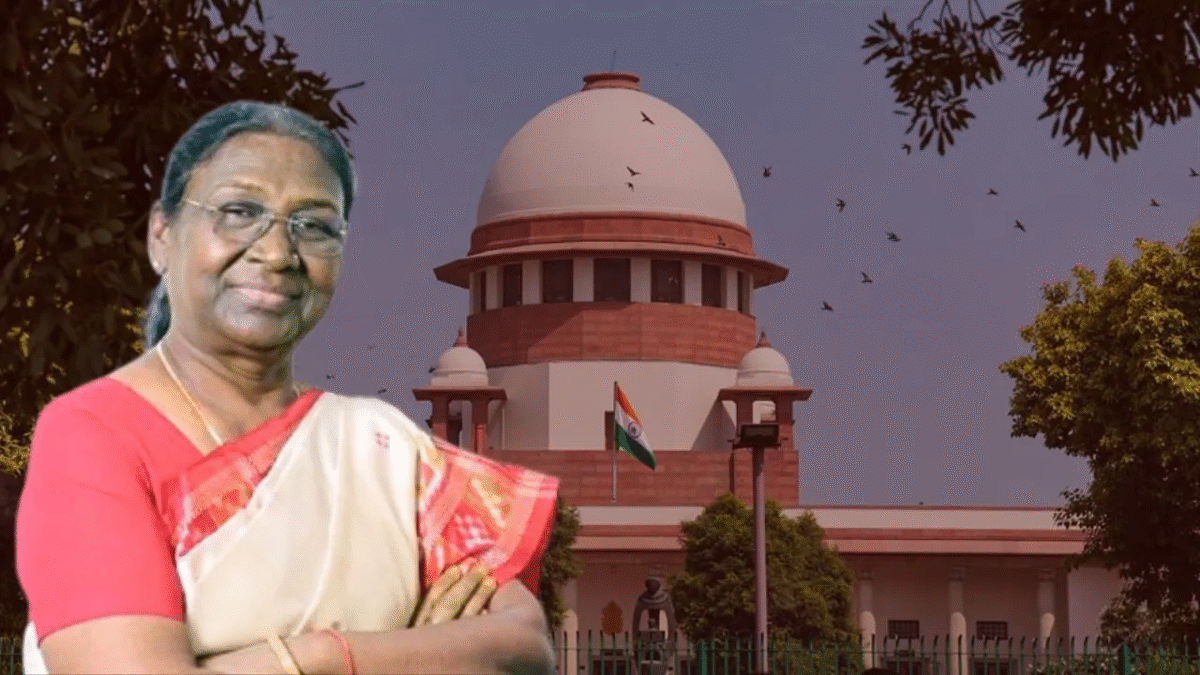New Delhi: Recently, the Supreme Court reprimanded the Governor of Tamil Nadu and ordered the President to take a decision on these Bills within three months. Therefore, there is a conflict between the President, the Governor and the Court. Objecting the court’s decision, President Draupadi Murmu today sent an important reference to the Supreme Court under Article 143 (1) of the Indian Constitution, asking whether the court could set a time limit for the Governor and the President to approve the bill. This question has been asked. Many questions have also been asked from the court.
Article 143 (1) of the Constitution allows the President to take the opinion of the Supreme Court on matters of legal and public importance. Now the Supreme Court will have to constitute a constitution bench to answer this reference. In particular, President Murmu has questioned the directive of the Supreme Court stating that if the time set by them is not followed to approve the Bills, it will be assumed that it will be assured. In this context, it was said that the concept of the estimated consensus of the President and the Governor is against the Constitution and it originally limits the powers of the President and the Governor.
President Murmu has asked 14 sharp questions from the Supreme Court. In which he emphasized that Articles 200 and 201 of the Constitution, which regulate the process of acceptance of the Bills by the Governor and the President, do not determine any time limit or specific procentive requirements.
14 questions asked by the President of India
1. When a bill is presented to the Governor under Article 200 of the Constitution of India, do they have constitutional options available?
2. When a bill is introduced under Article 200 of the Constitution of India, is the Governor bound by the assistance and advice of the cabinet using all the options available with him?
3. Is it justified by the Governor to use constitutional discretion under Article 200 of the Constitution of India?
4. Does Article 361 of the Indian Constitution completely ban the judicial review of the functions of the Governor under Article 200 of the Indian Constitution?
5. If there is no time-limit and method determined by the Constitution to exercise powers by the Governor, can a time-limit be imposed by the Governor to exercise all powers under Article 200 of the Constitution of India and can be ordered to be ordered by the court?
6. Is it justified by the President to use constitutional discretion under Article 21 of the Constitution of India?
7. Can the President implement the time limit and the method determined by the constitution through judicial orders and the prescribed method under Article 21 of the Constitution of India for the use of discretion by the President?
8. In the light of the Constitutional Plan that controls the powers of the President, is it necessary for the President to consult the Supreme Court by reference to the Constitution of India and when the Governor protects a bill for the acceptance of the President or otherwise, take the opinion of the Supreme Court?
9. Are the decisions of the Governor and the President appropriate in the phase before the implementation of the law under Article 200 and Article 21 of the Constitution of India? Are the courts allowed to take any judicial decision on its lesson before the law is enacted?
10. Can the use of constitutional powers and issued orders be changed by the President/Governor under Article 142 of the Constitution of India in any way?
Mustard Oil: Effective home remedy for hair growth and care
11. Does the law made by the State Legislature apply without the consent of the Governor under Article 200 of the Constitution of India?
12. Under the provisions of Article 145 (3) of the Indian Constitution, is it not mandatory for any bench of this Hon’ble Court to determine that the question involved in the proceedings is of nature that includes important questions of law as an interpretation of the Constitution and refer to the bench of at least five judges?
13. Whether the powers of the Supreme Court under Article 142 of the Constitution of India are limited to matters of procedural law or whether Article 142 of the Constitution of India involves issuing/ordering such instructions which are unlike or inconsistent against the existing original or procedural provisions of the Constitution or Applied Act?
14. Does the Constitution, apart from cases under Article 131 of the Constitution of India, banned any other jurisdiction of the Supreme Court to resolve disputes between the Central Government and the State Governments?
